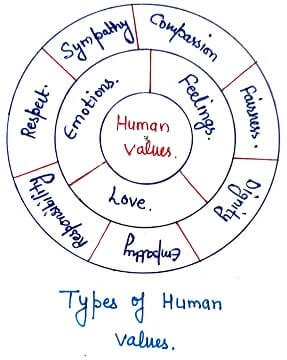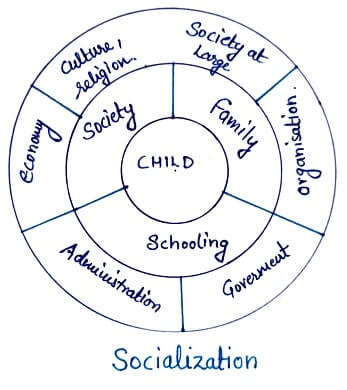Human Values are defined as the values which are related with the essence of the human element or human beings as humans i.e. when a human has an interface with other fellow being there should be a reflection of human elements such as feelings, emotions, dignity, respect, etc.
Human values are standards of conduct based on the essence of humans which guides the human interface. As a human people have feelings, emotions, love, etc. and therefore there should be mutual respect that is one human should respect other human emotions & feelings. Other human values are:
- The integrity of self.
- Empathy- thinking from other perspectives.
- Fairness.
- Respect.
- Responsibility.
- Compassion.

Significance of human Values:
Among all values, human values are considered ultimate and superior as they are related to the essence of being human. Such values are also considered universal in nature.
Mahatma Gandhi, Tagore, Ambedkar consider human values as most important above all values. Even they kept human values above the feeling of nationalism, patriotism simply because human values are for the entire humankind.
The basic essence of human existence is dignity & respect. It is due to the lack of dignity and respect that society has many issues such as conflict, tension, war, murder, etc. Examples: caste conflicts in India recently happened in Sharanpur in Uttarpradesh because of Dalit discrimination.
Human values and ethics:
Human values are one important standard of ethics as they are universal in nature. In fact, ethics is for the propagation of human value because the main aim is peace and harmony in society.
How Human values are acquired:
Human is born with emotion and feeling but not with human values. Although human has the capability to learn human values which are the difference between human and animal. Therefore, human is born with feelings, emotions, and the ability to learn, acquire human values. Such values are acquired through the process of socialization i.e. Behavior like compassion, empathy respect to dignity are learned by humans through Socialization.
Socialization:
Socialization is a process of learning human behavior from social institutions both formally and informally. Three important pillars of Socialization are:
- Family
- Schooling
- Society

Three-person influence Socialization; Parents, Teachers, and leaders.
Role of Parents:
Parenting is most influential in socialization. The quality of parenting largely determines the quality of behavior in the child. This is a general principle. That’s why parents take lots of care during childhood and are very sensitive about child behavior.
Role of schooling:
After parents and family, school is very important to inculcate human values in a child. In school children get knowledge about several topics of society and world. This knowledge helps him/her to make decisions based on their knowledge. Hence education helps them to understand what is wrong or what is right. Hence there is a need to ensure a better education facility for the child because this determines the behavior of humans in the future. The education system should not be only based on knowledge gained but also on ethical values learned.
Role of Society:
This mainly deals with the society in which the child is living. If society thinks negatively about things it will create the same kind of thinking in that child. In society mainly leaders play an important role to influence the thinking of children and adolescents. Childs can be influenced by any type of thinking then it may rightist, leftist, capitalist, socialist and so more. These leaders behave as an idle for some child. Their act or action directly impacts the behavior of the child. Hence leaders should be conscious about their acts or conduct because it directly impacts the future of the nation. These leaders may be from different fields. It may be a sportsman, politician, scientist, singer, or any actor. In society, religious values also influence the behavior of humankind.
Professional ethics:
It deals with ethical standards such as legal, health, medical, engineering, business, etc. Every profession has its own standards and ethical rules followed by them. It simply means that any professional ethics depends on:
- Professional expertise
- Efficiency
- Commitment
- Responsibility
- Objectivity
Different professions have may have different ethical standards such as the legal profession. The ethical standard for a lawyer is supposed to defend anyone’s case if there is merit or for appropriate trial i.e. if the Lawyer is defending Naxalite, terrorist, murderer, then his conduct will not be considered unethical. Although he should not defend inappropriately through the wrong facts. In society at a times, there have been protests by other legal fraternity against a lie or lawyer who defended any terrorist, Naxalites, etc.
Some other ethical standards related to a particular profession are:
1. Medical ethics:
The profession of a doctor is based on a hypocritical oath i.e. to save every human life. The relationship between doctor and patient is based on a spirit of saving human life. Therefore doctors should not be forced to act otherwise in the name of security and other concerns.
Health is also a basic right for an individual human. The core principle on which relation of a doctor and patient depends are:
- Saving life.
- Dignity, respect.
- Truthfulness.
- Compassion.
- Empathy.
- Service.
2. Ethical Standard related to civil Services:
Civil services are different from all other services because the main motto is to serve the people and ensure all government facilities should be provided to citizens and address grievances related to any services. Hence in this situation role of the civil servant is very important. Some standards which should be followed by Civil servants are:
- Neutrality/ Partiality.
- Selflessness.
- Objectivity.
- Responsibility.
- Commitment.
- Leadership.
3. Media ethics:
Media is the 4th pillar of democracy. Hence News and views should be given unbiased. They should be free and fair. It is found that media is not unbiased and there are issues of biases, discrimination such as paid news, the sensationalization of news for TRP was given priority to a particular type of news. Hence it is very important that on what standard the conduct of Media should be based. These are:
- Free and fair
- Independent
- Rational
- Promote freedom of speech.
- Unbiasedness.
- Should show news of national importance
4. Business ethics:
Business ethics also referred to as corporate ethics is a type of applied that ensure ethical principle or moral should follow in a business environment. It applies to all aspects of business conduct and is similar to the conduct of individuals and the entire organization. Some ethical standards for business are :
- Selflessness
- Profit without harming society
- Innovative
- Very clear about its decision-making.
- Brotherhood among its employee
Hence ethical standards are applied to every profession. These standards vary from profession to profession. One act may be good for one but may not be ethical for another one. But overall professional ethics ensure the conduct of humans based upon well-established standards.

Recent Comments